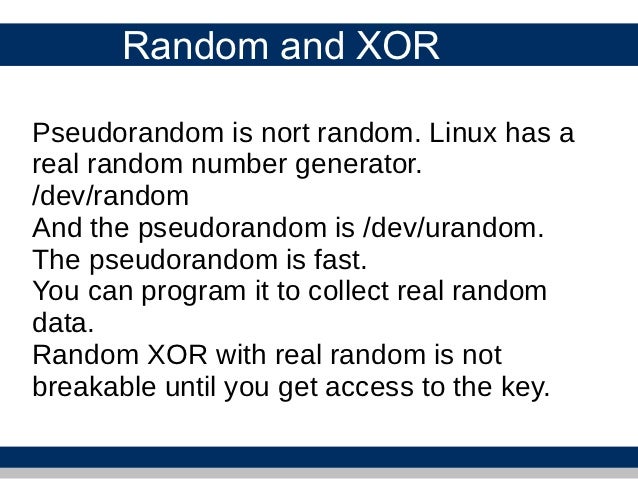In which practical situations would one want to use /dev/random in preference to /dev/urandom, and why? Basically none on a typical desktop or server system. Assuming the PRNG produces cryptographically secure random numbers, there is no reason to use /dev/random instead. While DOS does not naturally provide such functionality, there is an open-source third-party driver called noise.sys, which functions similarly in that it creates two devices, RANDOM$ and URANDOM$, which are also accessible as /DEV/RANDOM$ and /DEV/URANDOM$, that programs can access for random data. The Linux emulator Cygwin on Windows provide. I'm looking for ways to use /dev/random (or /dev/urandom) from the command line.In particular, I'd like to know how to use such a stream as stdin to write streams of random numbers to stdout (one number per line). I'm interested in random numbers for all the numeric types that. 1st CryptGenRandom is not 'truly' random device by they are enough random to be cryptographically safe. Similar under Linux (and most unixes) is reading from /dev/urandom. If you want to get real random numbers you may read /dev/random but you may get blocked waiting for system to collect them if entropy pool is too small. There is no difference between /dev/random and /dev/urandom; both behave identically. Apple's iOS also uses Yarrow. Other operating systems /dev/random and /dev/urandom are also available on Solaris, NetBSD, Tru64 UNIX 5.1B, AIX 5.2 and HP-UX 11i v2. Sep 16, 2011 Generate Long Digits Random Number in C / C. How are you doing? Well, let's get to the problem now. Is there a way to get a large random number in C or C? Please note that: I am using a Linux Box - not a Windows Box to test that,. I would agree with people above in that I would use /dev/random as the source of the seed.
- The C Standard Library
- C Standard Library Resources
- C Programming Resources

- Selected Reading
Description

The C library function int rand(void) returns a pseudo-random number in the range of 0 to RAND_MAX.
RAND_MAX is a constant whose default value may vary between implementations but it is granted to be at least 32767.
Dev Random Linux In Computer
Declaration
Dev Random Example
Following is the declaration for rand() function.
Parameters

NA
Return Value
This function returns an integer value between 0 and RAND_MAX.
Example
The following example shows the usage of rand() function.
Let us compile and run the above program that will produce the following result −